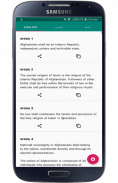







قانون اساسی افغانستان

Description of قانون اساسی افغانستان
کتاب قانون اساسی افغانستان، راهی ساده برای آگاهی مردم عزیز از قانون اساسی کشور میباشد.
موضوعات که شامل سر فصل کتاب قانون اساسی افغانستان میشود(قانون اساسی افغانستان)
- دولت
- حقوق اساسی و وجایب اتباع
- ریس جمهور
- حکومت
- شورای ملی
- جرگه بزرگ(لویه جرگه)
- قضا
- اداره
- حالت اضطرار
- تعدیل
- احکام متفرقه
- احکام انتقالی
قانون اساسی افغانستان یکی از مدرنترین قوانین اساسی درمیان کشورهای جهان به حساب می رود؛ در این قانون اساسی از سویی، به ارزشها و مطالبات تاریخی، کنونی و آینده مردم افغانستان و همینطور واقعیت های اجتماعی و فرهنگی جامعه توجه لازم صورت گرفته و از طرف دیگر، به ارزشهای جهان مدرن و ایجابات یک جامعه مطلوب دمکراتیک و قابل قبول برای جهان امروز.
از این رو، می شود گفت که این قانون اساسی یکی از افتخارات و دستاوردهای تاریخی مردم افغانستان به حساب می رود. با وجود ویِژگیها و برجستگی های فراوان در قانون اساسی کشور، بخاطر رعایت اختصار، درنوشتار پیش رو صرفا به سه مورد؛ یعنی شکل و ساختار نظام سیاسی،جایگاه و اهمیت جامعه مدنی و همچنین کثرت گرایی در ابعاد مختلف آن در این قانون پرداخته می شود:
1- نظام سیاسی در قانون اساسی: نظام سیاسی افغانستان جمهوری اسلامی است؛ جمهوری شکل و قالب نظام و اسلامیت محتوا و درون مایه آن می باشد.
این ساختار در واقع محصول سرگذشت تاریخ سیاسی سرزمین افغانستان، واقعیت های موجود اجتماعی و سیاسی کشور و نیز تجربه حکومت داری جهان معاصر است. جمهوریت، نشان دهنده جایگاه و نقش مردم در ایجاد و سمت و سو دهی نظام سیاسی کشور است؛ مردمی که قرن هاست از داشتن چنین حقی محروم بوده و در زیر یوغ حکومت های خودکامه و مستبد نفس می کشیده اند.
با ایمان راسخ به ذات پاک خداوند (ج) و توکل به مشیت حق تعالی و اعتقاد به دین مقدس اسلام.
با درک بیعدالتیها و نابسامانیهای گذشته و مصائب بیشماری که بر کشور ما وارد آمده است.
با تقدیر از فداکاریها، مبارزات تاریخی، جهاد و مقاومت بر حق تمام مردم افغانستان و ارجگذاری به مقام والای شهدای راه آزادی کشور.
با درک این که افغانستان واحد و یکپارچه به همهٔ اقوام و مردم این سرزمین تعلق دارد.
با رعایت منشور ملل متحد و با احترام به اعلامیهٔ جهانی حقوق بشر.
به منظور تحکیم وحدت ملی و حراست از استقلال، حاکمیت ملی و تمامیت ارضی کشور.
به منظور تأسیس نظام متکی بر ارادهٔ مردم و دموکراسی.
به منظور ایجاد جامعهٔ مدنی عاری از ظلم، استبداد، تبعیض و خشونت و مبتنی بر قانونمندی، عدالت اجتماعی، حفظ کرامت و حقوق انسانی و تأمین آزادیها و حقوق اساسی مردم.
به منظور تقویت بنیادهای سیاسی، اجتماعی، اقتصادی و دفاعی کشور.
به منظور تأمین زندگی مرفه و محیط زیست سالم برای همهٔ ساکنان این سرزمین.
و سرانجام، به منظور تثبیت جایگاه شایستهٔ افغانستان در خانوادهٔ بینالمللی.
این قانون اساسی را مطابق به واقعیتهای تاریخی، فرهنگی و اجتماعی کشور و مقتضیات عصر، از طریق نمایندگان منتخب خود در لویه جرگهٔ مورخ چهاردهم جدی سال یک هزار و سه صد و هشتاد و دو هجری شمسی در شهر کابل تصویب کردیم.
The Afghan constitution book is an easy way for dear people to know about the country's constitution.
Topics covered in Chapter of the Constitution of Afghanistan (Constitution of Afghanistan)
- Government
- Basic rights and obligations of nationals
- President
- Government
- National Council
- Grand Jirga (Loya Jirga)
- Ironically
- office
- Emergency mode
- Adjustment
- Miscellaneous sentences
- Transitional sentences
The constitution of Afghanistan is one of the most modern constitutions in the world; on the one hand, the historical, present and future values and demands of the Afghan people as well as the social and cultural realities of society have been taken into consideration and on the other. , To the values of the modern world and the demands of a democratically acceptable society acceptable to the world today.
Therefore, it can be said that this constitution is one of the historical honors and achievements of the Afghan people. Despite the many features and highlights in the country's constitution, due to its brevity, the following article deals with only three aspects: the form and structure of the political system, the status and importance of civil society, as well as pluralism in its various aspects. :
1. The Political System in the Constitution: The political system of Afghanistan is the Islamic Republic; the Republic is the form and content of the system and its Islam.
This structure is in fact the product of the history of the political history of Afghanistan, the existing social and political realities of the country, as well as the governance experience of the contemporary world. Republicanism reflects the position and role of the people in shaping and directing the political system of the country; people who have been denied this right for centuries and have been breathing under the yoke of despotic and authoritarian regimes.
By a firm belief in the pure nature of God (c) and by relying on the providence of transcendence and belief in the sacred religion of Islam.
Understanding the injustices and disasters that have plagued our country.
Praising the sacrifices, historic struggles, jihad and resistance to the right of all the people of Afghanistan and honoring the high status of the martyrs of freedom.
Realizing that Afghanistan is united with all the people of this land.
Respecting the United Nations Charter and respecting the Universal Declaration of Human Rights.
In order to strengthen national unity and safeguard the independence, national sovereignty and territorial integrity of the country.
In order to establish a system based on the will of the people and democracy.
To create a civil society free from oppression, despotism, discrimination and violence based on law, social justice, the preservation of human dignity and human rights, and the protection of the freedoms and fundamental rights of the people.
To strengthen the country's political, social, economic and defense foundations.
In order to provide a prosperous life and a healthy environment for all the inhabitants of this land.
And finally, to establish Afghanistan's rightful place in the international family.
We have adopted this constitution in accordance with the historical, cultural and social realities of the country and the requirements of the age, through our elected representatives in the Loya Jirga on the fourteenth day of the year one thousand three hundred and eighty two.

























